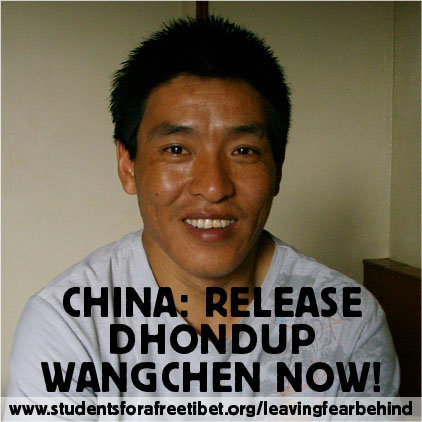Imprisoned Tibetan filmmaker and activist Dhondup Wangchen has been released from jail six years after he was detained for charges related to his documentary Leaving Fear Behind. From The Hollywood Reporter:
Dhondup and his assistant, Jigme Gyatso, were detained in March 2008, after they made Leaving Fear Behind, a documentary featuring Tibetans in the Qinghai province expressing views on the Dalai Lama, the exiled Tibetan spiritual leader; the Olympic Games, which were held in Beijing that year; and Chinese law.
[…] His jail term included time in solitary confinement from March 2012, but he was later transferred to Qinghai Women’s Prison in Xining, where conditions “improved” and relatives were able to visit him.
The ICT welcomed Dhondup’s release, with its president, Matteo Mecacci, saying: “He was held six years too long for simply making a film. Freedom of expression is a universal right and must be exercised by all citizens. We are glad Dhondup has now left the prison, and we hope he will soon be able to rejoin his family.” [Source]
Wangchen’s Leaving Fear Behind, which was smuggled out of Tibet, features a series of interviews that provide a critical perspective on Tibetans in China and their views on the Chinese authorities’ policies in the run-up to the Beijing Olympic Games. From Filming for Tibet:
[vimeo width=”500″ height=”400″]http://vimeo.com/50220285[/vimeo]
In a remarkable coincidence, filming concluded in early March 2008 on the eve of the eruption of unprecedented mass Tibetan protests across the Tibetan plateau. Shot primarily in the eastern provinces of Tibet, the film provides a glimpse into the hearts and minds of the Tibetan people and their longstanding resentment of Chinese policies in Tibet.
The filmmakers traversed thousands of miles, asking ordinary Tibetans what they really feel about the Dalai Lama, China, and the Olympic Games. The filmmakers gave their subjects the option of covering their faces, but almost all of the 108 people interviewed agreed to have their faces shown on film, so strong was their desire to express themselves to the world. Excerpts from twenty of the interviews, including a self-recorded interview of the filmmaker himself, are included in the 25 minute film. [Source]
The Committee to Project Journalists, which awarded Wangchen an International Press Freedom Award in 2012, recounts his plight and his wife Lhamo Tso’s efforts to campaign for her husband’s release.
Knowledge of Wangchen’s whereabouts came only after Jigme Gyatso, a monk who had helped shoot the film, was released after being jailed for seven months. A year later, in December 2009, Wangchen was sentenced to six years in prison. In January 2010, he was denied appeal.
Wangchen’s family was not told of the charges against him, and they learned secondhand that he had been convicted of inciting separatism. He has contracted hepatitis B in prison.
Wangchen moved his wife, Lhamo Tso, and four children to India before beginning the film, in order to protect them from reprisal by Chinese authorities. Tso, who has traveled internationally to campaign for her husband’s release, has ensured that Wangchen’s case remains in the public eye. [Source]
Monk Golog Jigme, who worked with Wangchen on Leaving Fear Behind, had recently escaped to India after repeated arrests and years of persecution at the hands of Chinese authorities. Calgary Herald reports:
Golog Jigme, 44, who had been arrested in China a few times since the documentary and alleges he was beaten severely during detention, said he was most recently detained in the Labrang monastery area in China’s Gansu province in 2012 for what he said was spreading pamphlets about Buddhist leader the Dalai Lama.
He said he managed to undo his leg shackles and escape. He survived in icy mountains for 20 months begging for food from passing nomads. Also, he said he discovered during that time that he had been falsely accused of murder, making it more urgent to escape to India.
“A large price on my head and my bad knees made it nearly impossible for me to escape, but thanks to the kindness of some people, I managed it,” he said in an interview with The Associated Press.
[…] Golog first was targeted by Chinese authorities for his role collecting material for the 20-minute film “Leaving Fear Behind,” a collection of interviews with Tibetan nomads expressing their discontent over Chinese rule in Tibet, just ahead of the 2008 Beijing Olympics. [Source]
When Golog Jigme was accused by the Chinese government of murder in 2012, he thought of immolating himself in protest but changed his mind after deciding to stay alive to fight for his cause. Phuntsok Yangchen at Phayul.com reports:
The Tibetan monk who assisted in making of a documentary film critical of the Chinese government’s policies in Tibet said he thought of setting himself on fire in protest against Chinese government’s allegation against him of murder in 2012. “The Chinese government never made such accusation when I was in their captivity, neither did I ever have intention of killing someone. I then thought of protesting this false allegation by setting myself on fire in front of one of the police stations in Gansu or Sichuan,” Golok Jigme Gyatso, who escaped to India earlier this month, said in his first interaction with the media.
“However, after careful consideration, I decided not to proceed with the plan. I felt perhaps they were embarrassed by my escape in 2012 that they had to make such allegations. I thought if I set myself on fire they would only continue to defame me by making such unimaginable allegations. I thought I could continue to be of service to the Tibetan cause by being alive and thus I changed my mind,” said Jigme. [Source]
Read more about Tibet and recent self-immolations, via CDT.








